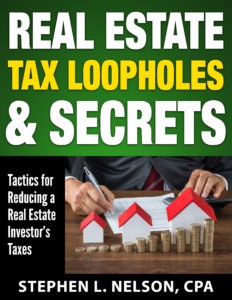Are you an active real estate investor? Are you still paying too much income taxes?
We’ve got a $40 monograph that can very possibly improve your predicament.
More Information…
Investing in real estate really complicates your taxes. You probably already know that.
But real estate tax laws also provide investors with numerous tax savings opportunities.
If you’re a real estate investor, for example, you probably have more opportunity than you even realize to create legitimate tax deductions that reduce your end-of-year tax bill. And many real estate investors also have opportunities to enjoy true, tax-free income.
Sure. You could try to get this information from the Internal Revenue Service’s website, perhaps by carefully reading through the information provided in IRS Publication 527 (available for free at Internal Revenue Service’s website in case you’re interested).
But what’s different about the approach this 85pp monograph takes is that it focuses on how you use the rules to your advantage.
What This Monograph Contains:
Chapter 1 – A Short Primer on Real Estate Tax Accounting, which explains how to measure taxable income or losses, forecast cash flows, and calculate depreciation (including dealing with the new bonus depreciation available for 2018 tax returns and cost segregation)
Chapter 2 – ABCs of Real Estate Tax Deductions, which provides the thorough coverage of the Section 212 statute for deductions and also the tangible property regulations for determining what counts as repairs and maintenance and what counts as capital improvements.
Chapter 3 – Avoiding Passive Loss Limitations, which presents a simple-to-understand discussion of how the passive loss limitation rules delay when you deduct real estate losses–and then discussions of the two approaches you have for sidestepping the limitations: the active real estate investor label and the real estate professional designation. Chapter 2 also discusses how the IRS shoots down the real estate professional designation for careless investors.
Chapter 4 – Understanding Section 199A, which includes a detailed discussion of how the new Section 199A deduction potentially saves real estate investors from paying tax on the last 20% of their real estate profits and also a review of the “trade or business” requirement investors need to meet in order to take the Section 199A deduction.
Chapter 5 – Avoiding Net Investment Income Tax, which covers how the net investment income tax applies to real estate investors and how careful investors can often avoid the tax on net rental income and on the sale of properties.
Chapter 6 – Disposing of Real Estate Assets, which steps readers through the way gains and losses on a sale or exchange get taxed. This chapter also discusses how to minimize gains on sale and how to attempt converting ordinary gains into capital gains.
Chapter 7 – Vacation Home Tax Shelters, which reviews the way that a second home can produce tax savings and possibly tax free income.
Chapter 8 – Converting a Primary Residence to a Rental, which describes when principal-residence-to-rental conversions make sense–and when they become a terribly costly mistake.
Chapter 9 – Using IRA Accounts for Real Estate Investment, which explains how one uses an IRA or 401(k) for real estate investment–and also discusses when this approach to real estate only increases your costs, investment risks and taxes.
Chapter 10 – LLCs, Corporations and Real Estate, which reviews why you may want to use an LLC for real estate, why you almost never want to use a traditional corporation for real estate, and why flippers may want to consider using an S corporation.
The Real Estate Loopholes and Secrets ebook also includes five appendices covering related real estate investment and taxation topics:
Appendix A – Analyzing Real Estate Investments Using Cap Rates, which describes how investors calculate and use income capitalization rates to assess rental properties.
Appendix B – Analyzing Vacation Home Investments, which presents a simplified approach to analyzing vacation home purchases.
Appendix C – Discounted Cash Flow Analysis of Real Estate Investments, which explains how to calculate internal rates of return and net present values (IRRs and NPVs) for real estate investments so as to get a sophisticated and powerful measure of a property’s potential profits.
Appendix D – Vacation Homes as Small Business Tax Shelters, which describes with some trepidation a popular tax savings gambit that some small business owners use.
Appendix E – Real Estate Investing as an Alternative to Tax-Deferred Retirement Accounts, which explains how some investors can use real estate as a highly-tax-efficient way to save for retirement.
In short, Real Estate Tax Loopholes & Secrets, gives you the inside scoop on how successful and smart real estate investors play the real estate investment game in a way that dramatically reduces the taxes they pay.
Money Back Guarantee
Thousands and thousands of readers have purchased our monographs and found them highly practical ways to get up to speed on complex tax law topics.
But all our monographs come with a money-back guarantee. If you don’t get value from your purchase and reading, we’ll happily fully refund your purchase price. (Just send us an email.)
